Vermicomposting = worm composting
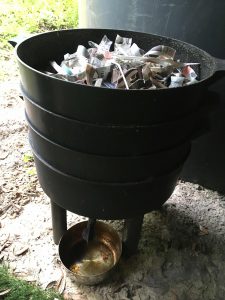
Do you live in a small space and want to have a neat little efficient compost bin to recycle your kitchen scraps? Vermiculture, also known as worm composting, is becoming increasingly popular with the urban agriculture movement and the rising interest in more sustainable gardening practices. Worms also eat paper and this can fill a niche for anyone working towards zero waste in their household.
Composting with worms is similar to having a regular compost pile. You add layers of browns and greens, always cover your fresh food waste, turn it occasionally, say once a week, keep it moist and harvest the worm castings. It’s best to purchase a worm bin that has three layers and catches the water in the bottom. You can also make your own worm bin using plastic containers.
Composting worms are special
Worms are living creatures and require special care. They may need some temperature moderation in hot or cold climates, like us humans. The ideal temperature for worms is between 60 and 80 degrees F. Place the bin in a shady area, not in direct sun. Composting worms do not burrow in the earth like regular earthworms; they naturally live above the ground in the leaf litter layer. To simulate their natural environment in a worm bin, use shredded paper, cardboard or plant leaves. The “bedding” is the base and top of each worm bin layer and the fresh food is in between, like a sandwich.
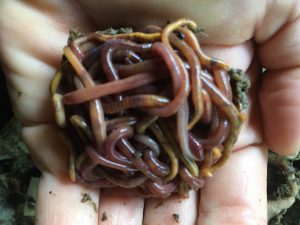
Worms eat fruit and vegetables, and paper!
Composting worms like a vegetarian diet of mostly fruits and vegetables. Their preferred foods include banana peels, apple cores, tomato, lettuce, kale, and most other fruits and vegetables. I think watermelon rinds are their absolute favorite food; you will see a bunch of worms piled up on the watermelon to eat it. They love the pulpy by-product from juicing and coffee grinds. Chopping your fruits and vegetables will speed up the decomposition process, the smaller, the better. Cooked fruit and vegetables are ok, preferably without too much oil.
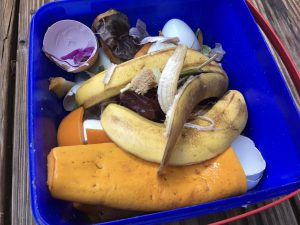
Go light on the carbs! Beware of adding bread and carbohydrate rich foods that can attract unwanted bugs like soldier flies. Soldier flies do not harm the worms but will eat the food and may heat up the bin if there are too many. Meat and dairy should be avoided because they can smell bad and harbor pathogens harmful to humans. Worms don’t really like citrus or onion because they are hard to break down and in excess, can make the bin acidic. Papaya seeds should be avoided because the high dose of papain may slow the worms reproduction. Avocado seeds, peach pits and mango seeds can be added but they are slow to decompose and they might start growing. These items and any other large compost items should be placed in your regular compost pile to break down.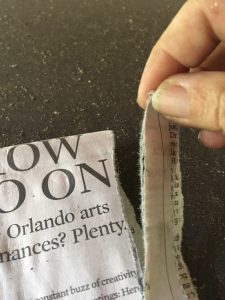
Bedding for worms
Every time you add food, cover with plenty of moist paper bedding. Newspaper works great and can easily be torn in strips by hand. You can use shredded office paper, coconut coir, cereal boxes, paper egg cartons, toilet paper rolls, junk mail minus the plastic window, and plant leaves. Avoid using heavy colored glossy paper or wax coated cardboard.
Use grit to aid worm digestion
Worms have no teeth and like a bird they break down food in their gizzard. It’s recommended to add some sort of “grit” to the bin such as rock dust, eggshells, or azomite to aid in the digestive process in the worm’s gizzard. These mineral rich additives will also improve the nutrient quality of your finished worm products that will help your plants grow.

Using the three-bin worm system
Home worm composting bins usually have multiple layers, arranged vertically. One layer is the active feeding layer while the other layers are resting. You can start the rotation when the bottom layer is fully decomposed and ready to harvest. Empty it out and put it on the top and start over. Instead of dumping the finished worm castings out on a tarp and separating the worms by hand, you can use a passive technique that includes drying out the finished worm compost and encouraging the worms to move to lower layers.
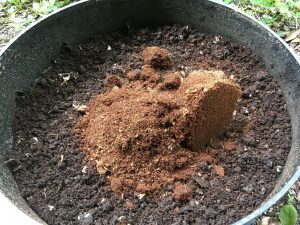
When the composting process is finished and you no longer see paper or food scraps, put the layer on the top. Add some coconut coir or potting soil and mix it in to reduce the moisture content in the worm castings. Do not water this layer so it can dry out and mix it frequently. This causes the worms to crawl down to where you have the fresh food and leave the bin containing the finished castings ready to harvest!
What to do with your worm compost
Worm compost is sometimes referred to by gardeners as “black gold” because it contains nutrients, organic matter, and beneficial microbes that help improve plant health. Add the worm compost to your potting soil mix (up to 20% by volume). You can also use it to top dress your container plants, mix it into your vegetable garden, and use it in any other way you would use regular compost. Worm compost can also be used to make worm tea to drench plant roots or spray on foliage.
What is worm tea?
Worm tea is worm compost that has been steeped in water for some time. Worm tea can be brewed in a 5-gallon bucket that is mixed by hand or aerated to mix with an aquarium bubbler. The nutrient content and concentration of beneficial microbes can vary based on the compost feedstock, length of time brewed, and amount of aeration or mixing. For more info on worm tea, read Tea Time in the Tropics.
Beware of worm leachate
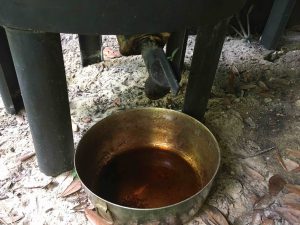
If you are composting with worms, it is important to learn the difference between worm tea and worm leachate. Worm tea comes from worm compost that is soaked in water for some time. Work leachate is the liquid that drips out of the worm bin. Leachate comes from the water that releases from your fruit and vegetable food scraps. It contains some nutrients but must be used with caution because it may contain harmful anaerobic bacteria if it has been sitting for a while. The safest thing to do is dump the leachate out on non-food crops.
Troubleshooting
What should I do if my worms are crawling out? The bin is too wet or dry or too hot. Add bedding, move to shade or put in frozen water bottles to cool it down.
What if my bin smells bad? Bin is out of balance with too much food. Add more bedding, mix food around with paper, stop watering and let the bin dry out a little bit.
What should I do if I have other critters, soldier fly larvae or little snails? These creatures are usually harmless, just let it be or reduce feeding and add more bedding. Cut the food up into smaller particles for quicker decomposition. Pick the insects out by hand if they bother you.
What if my worm castings are too wet? Reduce watering and add carbonaceous materials such as shredded paper, newspaper, cardboard, coconut coir, peat moss or potting mix.
Learn more about vermicomposting:
University of Florida – Vermicomposting
https://sfyl.ifas.ufl.edu/lawn-and-garden/vermicomposting/
North Carolina State Extension – Vermicomposting
https://composting.ces.ncsu.edu/vermicomposting-2/
Washington State University – Composting with Red Worms
http://whatcom.wsu.edu/ag/compost/Redwormsedit.htm
Want to learn more? Check out horticulture classes offered by UF/IFAS Extension Orange County at www.OCExtension.eventbrite.com. Read about Florida-Friendly Landscaping™ at https://ffl.ifas.ufl.edu/. Follow us on Facebook at https://www.facebook.com/GardenFlorida/ and Instagram at https://www.instagram.com/oc_extension/.
 1
1
